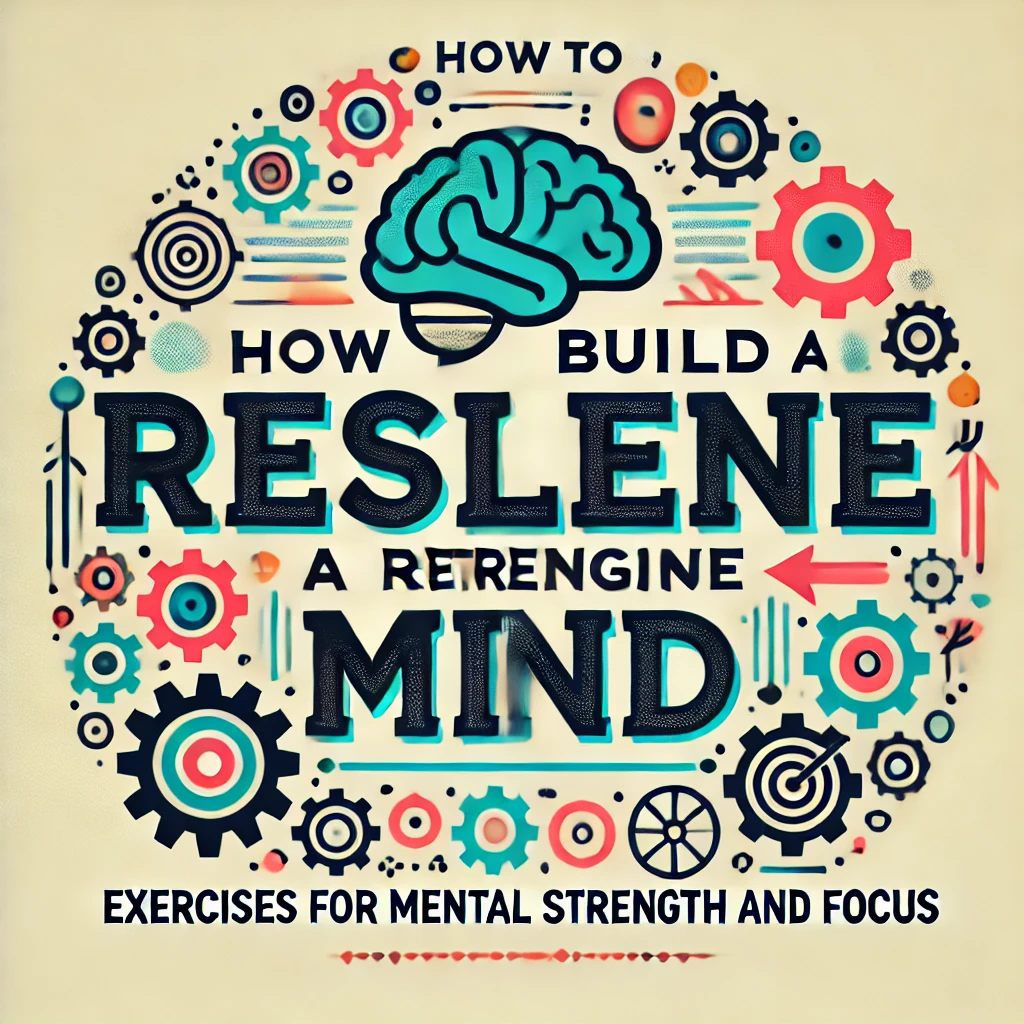Introduction
In today’s fast-paced world, building a resilient mind is more essential than ever. From handling daily stress to bouncing back from setbacks, mental strength and focus play a huge role in our ability to stay grounded and thrive. The good news is that, just like physical muscles, mental resilience can be strengthened with practice and dedication.
In this article, we’ll explore exercises for mental resilience, practical ways to build mental strength, and strategies to sharpen your focus. Whether you’re navigating challenges at work, juggling personal responsibilities, or simply looking to improve mental clarity, these techniques will help you develop a resilient mindset and mental toughness.
1. Start with Daily Mindfulness Practice
Mindfulness is a powerful tool for mental resilience. Practicing mindfulness regularly enhances focus, reduces stress, and promotes a clear mind. When we’re present, we’re better equipped to handle challenges calmly, making it easier to build resilience.
Benefits of mindfulness for mental resilience:
- Reduces stress: Being present reduces worry and helps us avoid overthinking, making us more adaptable.
- Improves focus: Mindfulness trains the mind to focus on one thing at a time, improving concentration.
- Builds emotional resilience: Practicing mindfulness allows us to process emotions in real-time, helping us avoid feeling overwhelmed.
Relatable anecdote:
I used to get overwhelmed at work, juggling multiple deadlines and responsibilities. When I started incorporating five minutes of mindfulness each morning, I found it easier to handle my tasks without getting stressed. It helped me stay focused, and my day felt more manageable.
Quick mindfulness exercise to get started:
- Deep breathing: Close your eyes, take a deep breath, and slowly exhale. Repeat this for a few minutes, focusing on each breath. This simple exercise reduces stress and increases mental clarity, setting a positive tone for the day.
2. Set Small, Achievable Goals Daily
Setting small goals is a great way to improve mental strength and focus. When we break down our larger objectives into manageable tasks, we build confidence and resilience with each success. This approach not only helps with focus but also reduces the chances of feeling overwhelmed.
How small goals build a strong mind:
- Provides structure: Small goals give the mind a clear direction, making it easier to concentrate on the task at hand.
- Builds confidence: Each small accomplishment reinforces self-belief, making it easier to tackle bigger challenges.
- Encourages consistency: Daily goals create a routine, which helps build resilience and discipline.
Example:
A friend of mine wanted to develop a resilient mindset to handle her busy schedule. She started by setting three small, daily goals. After a few weeks, she noticed she was less stressed and felt a sense of accomplishment each day, which motivated her to keep pushing forward.
Pro tip:
Write down three small goals every morning. Focus on completing each one before moving to the next. This practice helps keep your mind clear and builds mental toughness over time.
3. Practice Cognitive Restructuring
Cognitive restructuring is a technique used to challenge and reframe negative thoughts. By training your mind to see challenges as opportunities, you build resilience and reduce self-doubt. This technique is particularly effective for increasing mental toughness and clarity.
Steps to practice cognitive restructuring:
- Identify negative thoughts: When faced with a challenging situation, pay attention to any negative thoughts that arise.
- Challenge the thought: Ask yourself if the thought is accurate or helpful.
- Replace with a positive alternative: Try reframing the thought in a positive or neutral light.
Relatable anecdote:
I used to feel discouraged when a project didn’t go as planned. But when I started using cognitive restructuring, I trained myself to see setbacks as learning opportunities. This shift helped me stay focused and approach challenges with a problem-solving mindset.
Example of cognitive restructuring in action:
Instead of thinking, “I’ll never get this right,” try reframing it to, “I’m still learning, and each attempt brings me closer to success.” This small shift in perspective can make a big difference in mental resilience.
4. Strengthen Focus with Daily Meditation
Meditation is a proven way to enhance mental clarity and focus, which are crucial for building resilience. By practicing meditation, you train your mind to stay centered and calm, even in difficult situations.
How meditation builds mental strength:
- Improves focus: Meditation strengthens attention and concentration, making it easier to handle multiple responsibilities.
- Enhances emotional control: Regular meditation helps you manage emotions and react more calmly to stressors.
- Increases mental resilience: Meditation builds patience and self-awareness, which are essential for a resilient mindset.
Relatable anecdote:
I struggled to stay focused during stressful periods, but when I introduced a daily 10-minute meditation practice, I felt more in control of my emotions. Meditation helped me stay calm, and I could approach challenges with a clearer mind.
Pro tip:
Start with guided meditation apps like Headspace or Insight Timer. Even five to ten minutes a day can enhance focus and resilience over time.
5. Challenge Yourself with Mental Toughness Exercises
Just as physical exercises build muscle, mental toughness exercises help build a strong, resilient mind. Mental challenges encourage perseverance and determination, making it easier to face difficulties with confidence.
Ways to build mental toughness:
- Practice delayed gratification: This means resisting the urge for immediate rewards, which strengthens self-discipline.
- Cold exposure: Cold showers or splashing cold water on your face can help build mental resilience by teaching the brain to handle discomfort.
- Engage in difficult tasks: Tackle challenging puzzles or learn a new skill that pushes your limits to build mental endurance.
Example:
A friend started taking cold showers to build mental toughness. Though it was uncomfortable at first, she noticed that her ability to handle other stressful situations improved. Cold showers became her go-to exercise for mental resilience.
Pro tip:
Try challenging yourself with small discomforts each day, like taking the stairs instead of the elevator or waiting a few minutes before eating a treat. These small acts build resilience over time.
6. Build a Resilient Mindset with Positive Affirmations
Positive affirmations are short, empowering statements that reinforce self-belief and mental strength. Regularly practicing affirmations can help develop a resilient mindset, reducing self-doubt and improving confidence.
How affirmations support mental resilience:
- Builds self-belief: Affirmations reinforce positive thoughts, which helps build mental strength.
- Reduces stress: Repeating affirmations can reduce anxiety, creating a calm and resilient mindset.
- Improves focus on goals: Affirmations help keep you focused on your objectives, making it easier to achieve them.
Relatable anecdote:
I started using affirmations like “I am capable of handling any challenge” before work. It gave me a confidence boost and reminded me of my strengths, which helped me approach my tasks with a resilient mindset.
Examples of positive affirmations for resilience:
- “I am strong and capable of overcoming challenges.”
- “Every setback is an opportunity for growth.”
- “I am focused, determined, and resilient.”
Pro tip:
Write your affirmations down or say them aloud each morning. This habit reinforces your mental strength, helping you stay focused and resilient throughout the day.
7. Practice Gratitude to Build Mental Strength and Clarity
Gratitude is a powerful tool for developing resilience. By focusing on what you’re thankful for, you train your mind to see the positives in any situation, reducing stress and increasing mental strength.
Benefits of gratitude for resilience:
- Reduces stress: Focusing on positives helps reduce cortisol levels, promoting mental clarity.
- Builds emotional resilience: Gratitude encourages an optimistic outlook, making it easier to handle challenges.
- Improves focus on the present: Practicing gratitude keeps you grounded in the present, which helps improve mental clarity.
Relatable anecdote:
I started listing three things I was grateful for each morning, and it changed my perspective on stress. Instead of focusing on what was going wrong, I began to see challenges as manageable. This small practice strengthened my mental resilience.
Pro tip:
Keep a gratitude journal and write down three things you’re grateful for each day. Over time, this practice will build a positive mindset and improve mental clarity.
8. Stay Physically Active for Mental Resilience
Physical exercise doesn’t just benefit the body—it’s also a crucial part of building a resilient mind. Regular exercise releases endorphins, reduces stress, and improves mental clarity, which enhances your ability to stay focused and handle challenges.
How exercise strengthens mental resilience:
- Boosts focus and clarity: Exercise increases blood flow to the brain, improving mental clarity.
- Reduces anxiety: Physical activity reduces cortisol levels, promoting a calm mindset.
- Builds discipline: Committing to regular exercise strengthens self-discipline, which improves resilience.
Example:
I started going for a quick run each morning, and the mental clarity I gained was incredible. It helped me feel more focused, and I approached each day with renewed resilience.
Pro tip:
Choose an exercise routine that you enjoy, whether it’s walking, yoga, or strength training. Consistency is key to reaping the mental benefits of physical activity.
9. Develop Problem-Solving Skills for Mental Toughness
Problem-solving skills are essential for building mental toughness and clarity. By learning to see problems as opportunities, you can handle setbacks with a calm and solution-focused approach, which strengthens mental resilience.
Ways to improve problem-solving skills:
- Practice critical thinking: Break down complex problems into smaller parts to make them more manageable.
- Stay calm under pressure: Train yourself to pause, breathe, and assess situations calmly when challenges arise.
- Challenge assumptions: Question any negative thoughts that arise when facing a problem, and try to see it from a different perspective.
Relatable anecdote:
A friend of mine who works in tech started practicing problem-solving techniques for mental resilience. She told me it helped her approach work challenges more calmly, and she became more confident in her abilities.
Pro tip:
Use the “5 Whys” technique to analyze problems deeply. Ask “why” five times to get to the root cause of any challenge, helping you develop a clear, solution-oriented mindset.
10. Practice Self-Compassion for Long-Term Resilience
Self-compassion is the ability to be kind to yourself, especially during challenging times. By practicing self-compassion, you reduce self-criticism, which promotes mental clarity and builds resilience in the face of difficulties.
How self-compassion supports resilience:
- Reduces self-doubt: Being kind to yourself reduces negative self-talk, improving self-belief.
- Improves emotional stability: Self-compassion helps you stay calm and focused, even when facing setbacks.
- Enhances mental clarity: Treating yourself with compassion reduces stress, making it easier to think clearly.
Example:
I used to be hard on myself whenever I made mistakes, which only made me feel worse. But when I started practicing self-compassion, I found that I could bounce back more quickly and stay focused on finding solutions.
Pro tip:
When you catch yourself being self-critical, pause and ask, “How would I treat a friend in this situation?” This simple shift in perspective builds resilience and strengthens your mindset over time.
Conclusion
Building a resilient mind takes time and commitment, but with the right techniques, you can strengthen your mental toughness and improve your focus. From mindfulness and goal-setting to problem-solving and self-compassion, each of these exercises for mental resilience contributes to a strong, resilient mindset.
Remember, consistency is key. Start small by incorporating one or two techniques, and gradually add more as you develop your mental strength. With practice, you’ll find that building resilience becomes a natural part of your daily routine, empowering you to handle challenges with confidence and clarity.
FAQ Section
1. How does mindfulness improve mental resilience?
Mindfulness reduces stress and increases focus, helping you approach challenges calmly and with a clear mind.
2. What are the best exercises for mental strength?
Goal-setting, meditation, cognitive restructuring, and gratitude are powerful exercises for building mental strength.
3. Can physical exercise improve mental resilience?
Yes, physical exercise reduces stress, improves mental clarity, and builds discipline, all of which contribute to mental resilience.
4. How can cognitive restructuring help with mental clarity?
Cognitive restructuring shifts negative thinking into positive perspectives, reducing stress and promoting mental clarity.
5. Why is gratitude important for resilience?
Practicing gratitude encourages a positive outlook and reduces cortisol levels, making it easier to handle challenges.
6. How do affirmations support a resilient mindset?
Affirmations reinforce self-belief and reduce anxiety, creating a calm and focused mindset for tackling difficulties.
7. Can problem-solving skills improve mental toughness?
Yes, effective problem-solving skills help you stay solution-focused, which builds mental toughness and adaptability.
8. What is self-compassion, and why is it important?
Self-compassion involves treating yourself kindly during tough times. It reduces self-criticism and promotes mental resilience.
9. How does setting small goals build resilience?
Small goals provide structure, build confidence, and create consistency, all of which strengthen resilience over time.



